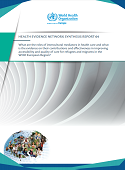What are the roles of intercultural mediators in health care and what is the evidence on their contributions and effectiveness in improving accessibility and quality of care for refugees and migrants in the WHO European Region? (summary) (2019)

Download
Summary of preliminary findings - Health Evidence Network Synthesis Report 64
Since the late 2000s, the number and proportion of refugees and migrants in the WHO European Region have substantially increased. A long-standing focus of WHO is protection of the rights of refugees and migrants, including their right to health. Despite this, refugees and migrants continue to encounter cultural and linguistic barriers in accessing high-quality health care in the Region, leading to health inequalities.
A recent initiative to address these barriers, the WHO Regional Office for Europe's Cultural Contexts of Health project, includes migration as one of its four key focus areas. Since the 1990s, intercultural mediators have been increasingly introduced to improve the accessibility and quality of health care for refugees and migrants. However, little is known about the roles performed by intercultural mediators in different countries and their effectiveness in resolving the existing barriers to health care.



